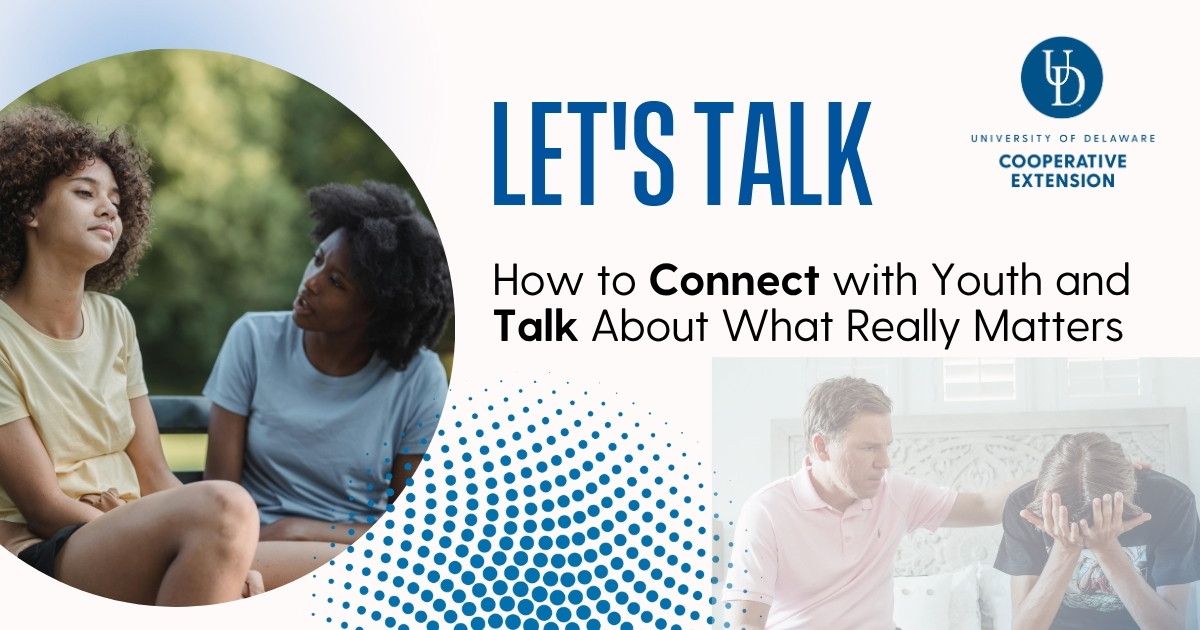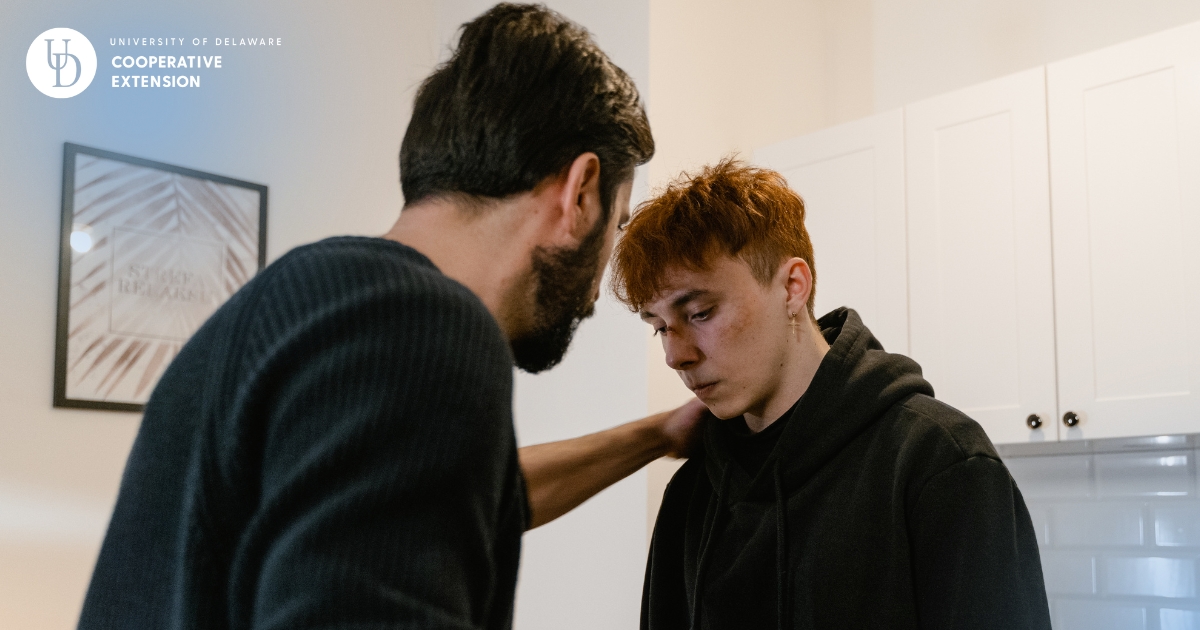
Category: Cooperative Extension

Let's Talk
July 30, 2025 Written by: Jennifer Seabrook-Scott, Leader of the Thriving Minds program, UD Cooperative Extension Health and Well-being agent
How to Connect with Youth and Talk About What Really Matters
Communication is the gateway to learning. Learning about a youth’s experience, whether it’s your child or someone else’s, requires knowing how to communicate with that child. Currently, youth are confronted with feelings of hopelessness and thoughts of suicide, as they contend with incidences of bullying at alarming rates. Many youths keep these thoughts, feelings, and occurrences to themselves. As the adults in their lives, we want to make sure we are having conversations to address these issues. Today, I lay out some guidelines and possible conversation starters to have with youth.
Guidelines:
Create a safe space: Choose a quiet, private setting where you can talk without interruptions.
Be Calm and empathetic. Avoid judgmental language or emotional reactions. Your calm demeanor will help the youth feel safe.
Listen More Than You Talk: Let the youth express their feelings and experiences without interruption (unless safety is an immediate concern).
Validate Their Feelings: Acknowledge and validate their emotions, even if you don't fully understand them.
Be Honest and Direct: Use clear and straightforward language. Don't sugarcoat or minimize the situation.
Avoid Blame & Shame: Focus on behaviors, not on character. Frame the conversation around solutions and positive change.
Reassure Them They Are Not Alone: Let them know that many people experience these challenges, and help is available.
Offer Support & Resources: Provide information about available resources (e.g., school counselors, mental health professionals, hotlines, websites).
Follow Up: Check in with the youth regularly to see how they're doing and offer ongoing support.
If the Youth is Being Bullied:
Acknowledge: "I'm so sorry this is happening to you. It's not fair, and it's not your fault." "Thanks for opening up to me. I am here to support you.”
Understand: "Can you tell me more about what's been happening? What are they saying or doing?"
Validate: "It's okay to feel scared/sad/angry. Those are normal feelings when you are experiencing______________”
Problem-Solve/ Explore Options: "Let's think about what we can do to stop it. Do you want to talk to a teacher, the principal, or another trusted adult?"/ "What have you tried so far? What do you think would help? What are your gut feelings?"
Safety: "Your safety is the most important thing. I want to make sure you feel safe at school and online."
Empower: "You have the right to feel safe and respected. Let's explore your options for taking action!"
Action: "Together, we'll make a plan. We can talk to [trusted adult], report the bullying, or find ways to avoid the bully."
Reassure: "You're not alone in this. I'm here for you, and we'll get through this together."
Resources: "There are people who care and want to support you. Let’s figure it out."
Phrases to Use:
"That's not okay, and you don't deserve that."
"It's not your fault. You didn't do anything to cause this."
"I'm here to listen, and I'll help you find a way to stop it."
"We'll work together to find people who can help you."
"I can see that this is affecting you, and that sucks."
"Your feelings are important, and they deserve to be respected."
"What are some options? Let's do something."

If the Youth is Bullying Others:
Conversation Steps:
Acknowledge: "I heard some things that you did. This isn't ok! Can you explain to me what these actions/behaviors are about? Tell me why you are handling things this way."
Consequences: "The things that you have done have hurt people, and what you do to others matters. I am with you through this process, but you should know that there will be negative consequences for what you have done."
Impact: "What you do, and how you behave, matters."
Empathy: “Remember it’s important for you to think about how you would feel if someone did that/said that, to you.”
Expectations: "This behavior has to end, tell me what would help to deal with these feelings of (anger/rage/fear/etc…)"

General Guidelines for Talking About Suicide with Youth:
Choose the Right Time and Place: Find a quiet, private setting where you can talk without interruptions. Avoid having the conversation when you are rushed, stressed, or distracted.
Stay Calm and Non-Judgmental: Approach the conversation with empathy and understanding. Avoid reacting with shock, fear, or anger.
Listen More Than You Talk: Allow the youth to express their feelings and experiences without interruption (unless safety is an immediate concern).
Use Direct and Clear Language: Avoid euphemisms or vague language. Use the word "suicide" to ensure clarity and avoid confusion.
Ask Direct Questions (If Necessary):
If you suspect a youth is considering suicide, it's okay to ask directly. Research shows that asking about suicide does not increase the risk and can provide relief.
"Have you been having thoughts of hurting yourself?"
"Have you been thinking about suicide?"
"Have you thought about how you would do it?"
Validate Their Feelings:
Acknowledge and validate their emotions, even if you don't fully understand them.
"I can see that you're struggling right now, and it's okay to feel this way."
"It sounds like you're going through a lot, and I want you to know that I'm here for you."

Reassure Them They Are Not Alone:
Let them know that many people experience suicidal thoughts, and help is available.
"You're not alone in this. Many people have these thoughts, and it doesn't mean you're weak."
Emphasize That Suicide Is Not a Solution: Convey that suicide is a permanent solution to a temporary problem.
"Suicide is never the answer. There are always other options, and things can get better."
"I know it might feel like there's no way out right now, but there is hope. We can find a way to make things better."
Offer Hope and Encouragement: Highlight their strengths, past successes, and reasons for living.
"You're a strong and resilient person. You've overcome challenges before, and you can do it again."
"I know you have a lot to offer the world, and I want to help you find ways to feel better."
Offer Support and Resources: Provide information about available resources (e.g., school counselors, mental health professionals, hotlines, websites).
"There are people who care about you and want to help. We can find a therapist or counselor who can support you."
"I can give you some phone numbers and websites where you can talk to someone right away."
Create a Safety Plan (If Necessary): If the youth is actively considering suicide, work with them to develop a safety plan that includes:
Identifying warning signs.
Listing coping strategies.
Listing people they can contact for support.
Identifying a safe place to go.
Removing potential means of self-harm.
Involve Parents/Guardians (If Appropriate): Unless there is a compelling reason not to, involve the youth's parents or guardians in the conversation.
"I think it would be helpful to talk to your parents about this. They care about you and want to support you."
Seek Professional Help: Encourage the youth to seek professional help from a mental health professional.
"It's important to talk to a therapist or counselor who can help you work through these feelings."
Follow Up:
Check in with the youth regularly to see how they're doing and offer ongoing support.
"I will check in regularly to see how you're doing. Please know that you can always talk to me about anything."
Conversation Steps:
Check-In: "How have you been feeling lately? I’m here to listen, you can tell me anything."
Normalize: "It's normal to feel overwhelmed. Let’s breathe a little."
Professional Help: "There are people who can help you!
Reassure: "You are not going to feel like this always”.
Mental health resources for youth in Delaware.
The Trevor Project
Crisis services for LGBTQ+ youth
Text ‘START’ to 678-678
National Suicide Prevention Lifeline
1-800-273-TALK (8255) or 988
Crisis Text Line
Text ‘DE’ to 741741
Sean’s House
Open 24/7 for High School and College students
(302) 294-6134
136 W. Main Street, Newark, DE
Help is Here-www.helpisherede.com
